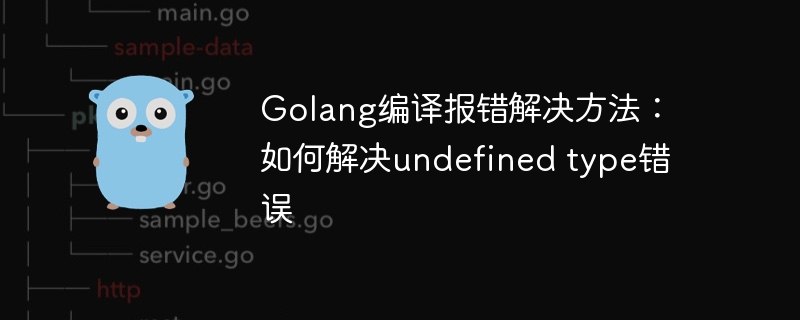Home >Backend Development >Golang >Golang compilation error solution: How to solve undefined type error
Golang compilation error solution: How to solve undefined type error
- WBOYWBOYWBOYWBOYWBOYWBOYWBOYWBOYWBOYWBOYWBOYWBOYWBOriginal
- 2023-11-25 11:03:591731browse

Golang compilation error solution: How to solve undefined type error
Abstract: Golang is a strongly typed static compilation language. During the code compilation process, sometimes An undefined type error will be encountered. This article will introduce the causes and solutions of undefined type errors to help developers better understand and solve this problem.
Introduction:
Golang’s compiler usually performs type checking to ensure the correct use of variables and functions. However, during code compilation, sometimes undefined type errors occur, usually due to referencing an undefined type. This article will explore the reasons for encountering undefined type errors in Golang and provide solutions.
- Causes of undefined type errors
In Golang, undefined type errors are usually caused by the following reasons:
1.1 Type not defined (Type not defined): An undefined type is referenced in the code.
1.2 Incorrect package import: The package is not imported correctly, resulting in the inability to access types defined in other packages.
1.3 Circular imports: Two or more packages import each other, forming a circular dependency that cannot be resolved by the compiler.
- Methods to solve undefined type errors
For the above reasons, we can take the following methods to solve undefined type errors:
2.1 Confirm whether the type is correctly defined
First, we need to confirm whether the type referenced in the code is correctly defined. In Golang, we need to declare the type first and use that type in the code. If the type is not declared or defined correctly, an undefined type error occurs. Therefore, we need to check the code for undefined types and make sure they are defined correctly.
2.2 Check the correct import of the package
If we reference types in other packages in our code, we need to ensure that the package is imported correctly. In Golang, you use the import statement to import a package to use the package's types, functions, or variables in your code. If we don't import the required package, the compiler won't be able to find the corresponding type, resulting in an undefined type error. Therefore, we need to check the imported packages in the code and make sure that the imported packages are correct.
2.3 Handling circular imports
In Golang, circular import means that two or more packages import each other, forming a circular dependency relationship. This causes the compiler to fail to parse the file and report an undefined type error. To solve this problem, we can use one of the following methods:
2.3.1 Refactor the code logic: Try to reorganize the structure of the file to avoid circular imports.
2.3.2 Use interface: If two or more packages depend on each other, consider using interfaces to decouple the dependencies between them.
Summary:
During the compilation process of Golang, we may encounter undefined type errors. Typically this is caused by undefined types, package import errors, or circular imports. To solve this problem, we need to ensure that types are correctly defined, packages are imported correctly, and handle circular import issues. By understanding and implementing the above workarounds, we can better resolve undefined type errors and improve our Golang development experience.
The above is the detailed content of Golang compilation error solution: How to solve undefined type error. For more information, please follow other related articles on the PHP Chinese website!
Related articles
See more- Solution to blue screen 0*0000003b when computer starts up
- How to solve the TP6 error 'The current access route is not defined or does not match'
- 0x80240037 solution
- Detailed introduction to the Golang compilation process and its principles
- What should I do if the executable file compiled by golang is too large?

